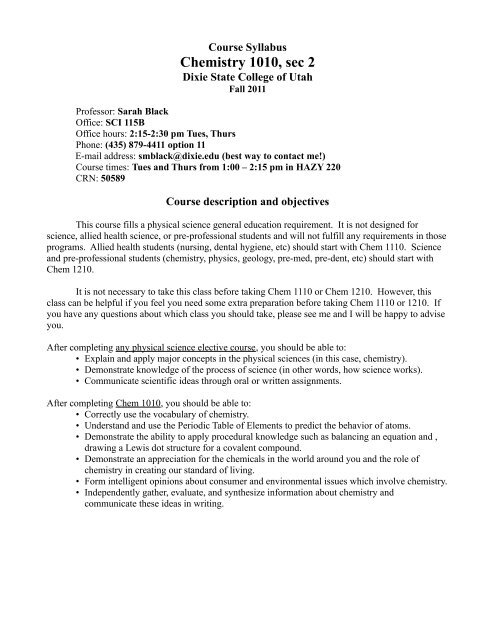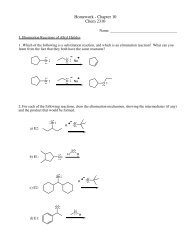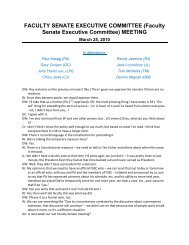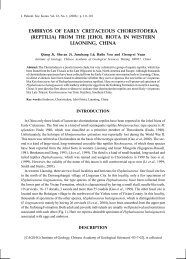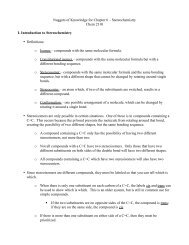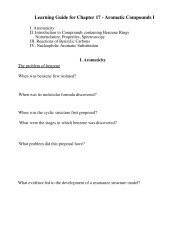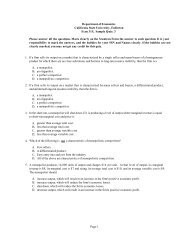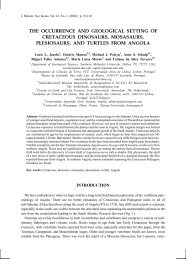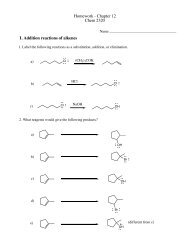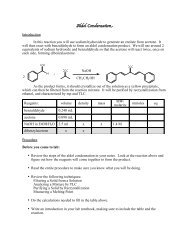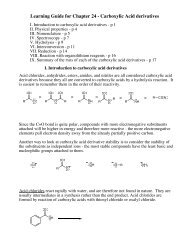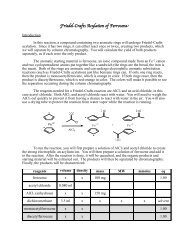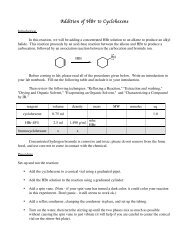Course Syllabus - Dixie State College
Course Syllabus - Dixie State College
Course Syllabus - Dixie State College
Create successful ePaper yourself
Turn your PDF publications into a flip-book with our unique Google optimized e-Paper software.
<strong>Course</strong> <strong>Syllabus</strong>Chemistry 1010, sec 2<strong>Dixie</strong> <strong>State</strong> <strong>College</strong> of UtahFall 2011Professor: Sarah BlackOffice: SCI 115BOffice hours: 2:15-2:30 pm Tues, ThursPhone: (435) 879-4411 option 11E-mail address: smblack@dixie.edu (best way to contact me!)<strong>Course</strong> times: Tues and Thurs from 1:00 – 2:15 pm in HAZY 220CRN: 50589<strong>Course</strong> description and objectivesThis course fills a physical science general education requirement. It is not designed forscience, allied health science, or pre-professional students and will not fulfill any requirements in thoseprograms. Allied health students (nursing, dental hygiene, etc) should start with Chem 1110. Scienceand pre-professional students (chemistry, physics, geology, pre-med, pre-dent, etc) should start withChem 1210.It is not necessary to take this class before taking Chem 1110 or Chem 1210. However, thisclass can be helpful if you feel you need some extra preparation before taking Chem 1110 or 1210. Ifyou have any questions about which class you should take, please see me and I will be happy to adviseyou.After completing any physical science elective course, you should be able to:• Explain and apply major concepts in the physical sciences (in this case, chemistry).• Demonstrate knowledge of the process of science (in other words, how science works).• Communicate scientific ideas through oral or written assignments.After completing Chem 1010, you should be able to:• Correctly use the vocabulary of chemistry.• Understand and use the Periodic Table of Elements to predict the behavior of atoms.• Demonstrate the ability to apply procedural knowledge such as balancing an equation and ,drawing a Lewis dot structure for a covalent compound.• Demonstrate an appreciation for the chemicals in the world around you and the role ofchemistry in creating our standard of living.• Form intelligent opinions about consumer and environmental issues which involve chemistry.• Independently gather, evaluate, and synthesize information about chemistry andcommunicate these ideas in writing.
PrerequisitesYou do not need to have taken any previous chemistry classes to succeed in this class. We willbegin at the beginning and cover several basic concepts of chemistry which are also found in highschool chemistry classes. However, the pace will be much faster than a high school class, and if theseconcepts are new to you, you will need to use good study skills and most likely the help of fellowstudents or the Tutoring Center in order to master them. The focus and purpose of this course is alsodifferent from high school chemistry. Even if you have already been exposed to the basic concepts,many of the applications we will talk about will be new to you.Success in this course requires basic math skills, such as the ability to add, subtract, multiplyand divide three digit numbers without a calculator, use negative numbers, and interpret simpleequations. If your ACT or placement score indicates that you should take Basic Math/Pre-algebra(MATH 0900) or Elementary Algebra (MATH 0930), I recommend that you drop this class and enrollagain once you have successfully completed these math courses.Required MaterialsThere is no textbook required for this course. Everything you need will be posted on the coursewebsite. If you do not have internet access at home, you can access the course website at the computercenter in the basement of the library or the Smith Computer Center. The address is:http://cactus.dixie.edu/smblack/chem1010/On the course website you will find:• a copy of this syllabus• a copy of the Student/Professor Contract• weekly announcements and reminders• a class schedule including exam dates• lecture notes for each day of lecture• a copy of the learning guide for each lecture• information to help you prepare for each exam• a vocabulary list for each unit• extra credit assignmentsYour first assignment is to find the course website and locate the Student/ProfessorContract. Read this contract, print it out, sign it, and bring it to class on the day following when youreceive this syllabus.You will also need to access Blackboard Vista in order to answer Study Questions after eachlecture. Go to the DSC website and click on “Blackboard Vista” in the left hand column. Login usingyour DSC Username and password (if you don't know what they are, use the links on the page to findout).
GradesYour grade will be assigned based your attendance, preparation for and participation in groupdiscussions, and your performance on study questions, exams, and the final. Each of these is weighteddifferently (as shown below), so you cannot simply take a percentage of your total points to determineyour grade. An individualized grade report will be e-mailed to your Dmail account after each exam;you may also e-mail me at any time to receive an updated grade sheet.Assignments% of totalAttendance – 10 points each day 10%Study questions – variable points 30%Group discussions – 20 points each 10%Exams – 100 points each 40%Final – 200 points 10%Attendance (10%) – You are expected to attend class every day it is held, and to make aconsistent effort to be on time. Roll will be called each day at the beginning of class, and you willreceive 10 points for each day you attend class. If you arrive late, please come up after class and letme know that you were here.If you miss class for any reason, you will not be able to make up the attendance points;however, I will consider excusing these points if you have a serious illness or miss class due to schoolsponsoredactivities. Please contact me by e-mail to make a request. One or two absences during thesemester is not likely to affect your grade, but multiple absences will have an effect. However, you canstill learn the material for that day by reading the lecture notes and filling out the learning guide forthat day, and you can still do the study questions for full credit. Please see the instructions on thecourse website entitled "What to do if you miss class.”Study questions (30%) – For each lecture I will post a set of study questions on Blackboard.These questions will help you to review the most important information or skills that you should havelearned that day, and should be completed sometime between the end of class and noon on the day ofthe next class period. They will be graded online so that you can see how you did right away. Duringthe allotted time, you may try again up to three times to get the answers correct; only your highestscore will be counted. If you don’t do them on time, you have up until noon on the day of the reviewsession for that unit to complete them for late credit (10% penalty). After that, they cannot be madeup.Group discussions (10%) – At the end of each unit we will have a group discussion about anenvironmental or consumer issue that relates the principles we have been learning to a real lifesituation. Your assignment will be to look up information ahead of time and be able to contribute tothe discussion of the topic; see the course website for details. You will receive credit for coming to thediscussion prepared and for writing an in-class essay on the topic. I will try to remind you in classwhen these days are coming up, but it is your responsibility to look at the schedule and be prepared. Ifyou are unable to attend, you can receive credit for writing the essay, but not for coming prepared andparticipating in the discussion.Exams (40%) – Four unit exams will be given in the testing center. Each will be available fortwo school days. Information about this exam, including some review questions, will be posted on thecourse website. On the first day the exam is available, a review session will be held in class, during
which you will work on the review questions in groups. During this time you may also ask questionsabout anything in the unit that you need further help understanding.The exams will consist of two pages of hand written questions such as matching and fill in theblank, 30 multiple choice questions, and a short essay taken from a list that will be provided on thecourse web site before each exam. You will need a scantron to answer the multiple choice questions.There is no time limit on the exams. In order to receive full credit, exams must be taken on the daysthey are scheduled. If you miss the exam days, you may see me for permission to take the exam latewith a 10% penalty. If you have a difficulty such as a serious illness that you can document, the latepenalty may be waived at my discretion.Exams will usually be graded within a week of when you take then. I will bring the exams toclass for your review; after this, they will be available in my office so that you can see how you did onspecific items. I encourage you to look carefully at your exam so that you can see what kinds ofmistakes you made and determine how you can improve your performance.Final Exam (10%) – The final exam will be given in our regular classroom during the examperiod determined by <strong>Dixie</strong> <strong>State</strong> <strong>College</strong>. It will cover material from the entire semester. You will beallowed to use your learning guides, lecture notes printed from off of the course website, and any otherwritten material that you want, but you may not use any textbooks or computers of any kind. Failureto take the final exam will result in dropping at least a letter grade. If you miss the final exam for anyreason, please contact me immediately.Extra credit – There will be a few extra credit assignments listed at the end of each lecture;once you get the sense of what they are, you are welcome to suggest projects for my approval. Youmay do up to one extra credit assignment for each unit. It will add up to 5 points to your score on theexam for that unit. However, it will not be possible to make a major change in your grade using extracredit. Please do not come to me near the end of class to ask for extra credit to make up for poorperformance the whole semester.Letter grades will be assigned based on % of points earned on the scale shown below, whichwill reflect the weighted sum of the percentages you earn in different categories.A 93.0 – 100% C+ 77.0 – 79.9%A- 90.0 – 92.9% C 73.0 - 76.9%B+ 87.0 – 89.9% C- 70.0 – 72.9%B 83.0 – 86.9% D 50.0 – 69.9%B- 80.0 – 82.9% F 0 - 49.9%A grade of “incomplete” will only be given in circumstances where a student has been doingwell in the class but has a difficulty such as serious illness during the last few weeks of the semester.
How to Succeed in the ClassIt has been my experience that many students who take Chem 1010 are still making thetransition between high school and college level expectations. In high school, teachers and parentswere still asked to take some responsibility for your success or failure. In college, it’s time for you totake charge. Professors are there to offer you learning opportunities, but it is your job to takeadvantage of them. Here are some suggestions for what it will take to do well.1. Come to class every day! The most common cause of students earning poor grades in this course isskipping class. If you miss a day or two during the semester, it won't be a big deal, but since our classmeets only twice a week, you can get behind pretty fast.2. Use class time to learn. If you are here in body but not paying attention, it won't do you much good.Don't just passively fill out the learning guide – think about what you are hearing and try to understandit. Ask questions. Try to get enough sleep the night before so that you are rested and alert. Eat lunchbefore you come to class, preferably something healthy rather than junk food. If you find yourselfgetting lost often during class, it may help to look through the lecture notes on the course websitebefore you come to give you an idea of what we will be discussing.3. Review the learning guide and do the study questions each day after class. Plan a time to do thisregularly. Use the lecture notes to review anything you didn't understand. Use your three tries to getas many points as you can on the Study Questions. Don't put the Study Questions off until the lastminute, or you could end up with computer problems and have to take them late.4. Get to know other class members. Talk to the students around you before class, and if you findsomeone you feel comfortable with, suggest studying together. It is ok to work on the Study Questionstogether as long as you don't copy the answers from another student without knowing the answeryourself. Discussing the concepts together can really make a difference in your understanding,whether you are doing the explaining or the listening.5. Come prepared to the group discussions. Look ahead and mark them on your calendar so you won'tforget. Schedule time to do a good job finding information about the topics so that you'll feelcomfortable participating in the discussion.6. Start reviewing the material for the exam a few days before you take it. Don't count on long hoursof studying the night before to do it – three one hour study sessions are better than one three hour studysession. Try not to take the exams at the last minute. Plan ahead when you will take them, and allowyourself plenty of time.7. If you find yourself struggling, get help early. Get a study group together, go to the tutoring center,or see me. If you wait until late in the semester, there won't be much anyone can do to help.Anyone can get a good grade in this class. If you do all of the things above, you should findyourself doing well. If you try to get by with skipping some of them, you may not be happy with theresult. If you don't like your grade on the first exam, take stock of your study habits and changesomething. If you just keep doing what you are doing, you will end up with the grade you are getting.But if you make some changes, there is a good chance you will be able to earn the grade you want.
Other Useful Stuff<strong>College</strong> approved absences: <strong>Dixie</strong> <strong>College</strong> Policy explains in detail what needs to happen if youanticipate being absent from class because of a college-sponsored activity (athletic events, clubactivities, field trips for other classes, etc). Please read this information and follow the instructionscarefully! The policy can be found at: http://www.dixie.edu/humanres/policy/sec5/523.htmlDmail: Important class and college information will be sent to your Dmail account. This informationincludes your DSC bill, financial aid/scholarship notices, notification of dropped classes, reminders ofimportant dates and events, and other information critical to your success in this class and at DSC. AllDSC students are automatically assigned a Dmail account. If you don't know your user name andpassword, go to www.dixie.edu and select “Dmail,” for complete instructions. You will be heldresponsible for information sent to your Dmail email, so please check it often.Important DSC dates to remember (for course dates, see schedule on the last page):Mon, Aug 22Wed, Aug 24Mon, Aug 29Mon, Sep 5Tues, Sep 6Mon, Sep 12Mon, Sep 12Tues, Sep 13Fri, Sep 16Fri, Sep 30Wed, Oct 12Thurs, Oct 13 - Fri, Oct 14Mon, Oct 17Fri, Nov 11Wed, Nov 23 – Fri, Nov 25Fri, Dec 9Mon, Dec 12 – Fri, Dec 16Classwork startsLast day to add without a signatureDrop fee begins ($10 per class)Labor Day (no classes)$50 Late registration/payment feeLast day for refundLast day to drop without a “W” gradeClasses dropped for non-paymentLast day to add classesLast day to apply for graduationMidterm grades dueSemester BreakLast day to drop or audit classesLast day for complete withdrawalThanksgiving Break (no classes)Last day of classesFinal examsDisability Accommodations: Students with medical, psychological, learning or other disabilitiesdesiring reasonable academic adjustment, accommodations, or auxiliary aids to be successful in thisclass will need to contact the DISABILITY RESOURCE CENTER Coordinator (Baako Wahabu) foreligibility determination. Proper documentation of impairment is required in order to receive servicesor accommodations. DRC is located at the ground floor of the Financial Aid Office. Visit or call 652-7516 to schedule appointment to discuss the process. DRC Coordinator determines eligibility for andauthorizes the provision of services.
<strong>College</strong> resources: Several college resources are available to help you succeed. Check out the linksfor each one to get more information.If you need help understanding the content of your courses, go to the Tutoring Center located inthe Browning Learning Center, Room 105. There is a schedule of what courses have tutors atwhat times outside the door. You can also visit them online at http://dsc.dixie.edu/tutoring/If you need help writing papers, go to the Writing Center in the Browning Learning Center,Room 105. You can also visit them online athttp://new.dixie.edu/english/dsc_writing_center.phpIf you need to use a computer to do schoolwork on campus, go to the Computer Center in theSmith Computer Center or the Library basement.If you are assigned to take a test in the Testing Center, go to the first floor of theCareer/Financial Aid Building. You can get information on their website athttp://new.dixie.edu/testing/The Library has all kinds of information and resources. Visit the Val Browning Library or go tothe library website at http://library.dixie.edu/Classroom expectations: It is the responsibility of an instructor to manage the classroom environmentto ensure a good learning climate for all students. This means not talking when the teacher is talking,following instructions, and speaking and acting respectfully to the professor and fellow students. Ifyour behavior is disruptive, I will first let you know verbally that you are behaving inappropriately. Ifit continues, I will send you written notice that your behavior must change. As a last resort, I will dropyou from the class. For more details, please see the disruptive behavior policy at:http://www.dixie.edu/humanres/policy/sec3/334.htmlAcademic honesty: I believe that most students are honest, and I don't want to punish everyone for thefew that aren't. However, I will not tolerate cheating, and if I discover that it has occurred, a zerograde will be given for that assignment or exam, and you will not be allowed to make it up. Repeatedor aggravated offenses will result in failing the course.Any time you take credit for work you did not do, you are cheating. This includes getting the answersto homework problems from someone else, copying information from a library or internet source andpresenting it as if it were your own words (plagiarism), looking at someone else's answers on an exam,and asking someone who has already taken a test about what questions it contains.I have tried to design assignments and exams to minimize the temptation to cheat, but itis not my job to prevent you from cheating. If you cheat and are not caught, it doesn't mean that you"beat the system." It means you violated the Student Code and forfeited your integrity,whether or not you are caught. You will pay the price, sooner or later. Having served on thecommittee that disciplines students for academic dishonesty, I can promise you that it is betterto fail an assignment or even a class than to cheat and lose the chance to continue youreducation. (See “Student Code” http://library.dixie.edu/policies/studentcodesectionfour.pdf page 8).


